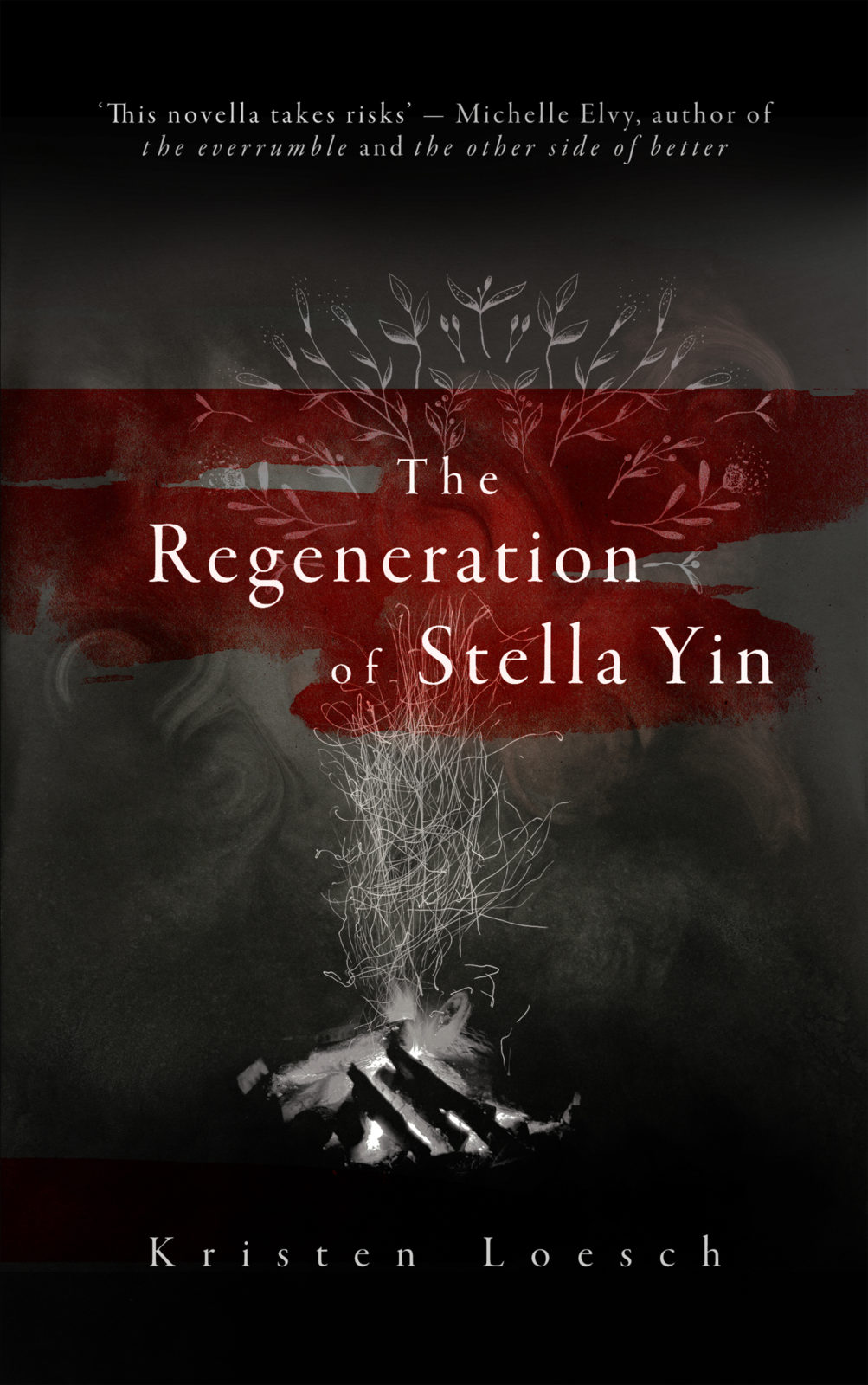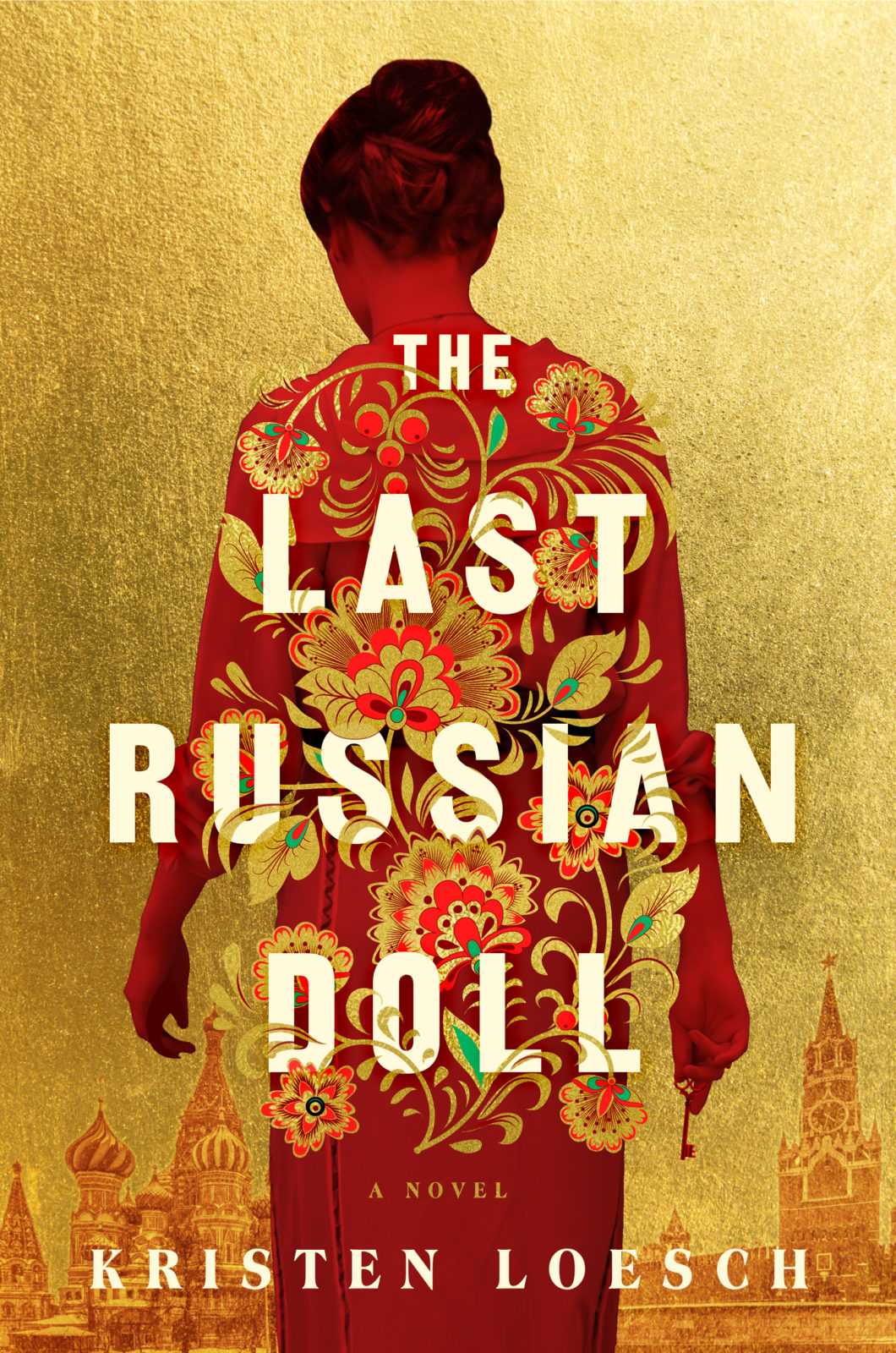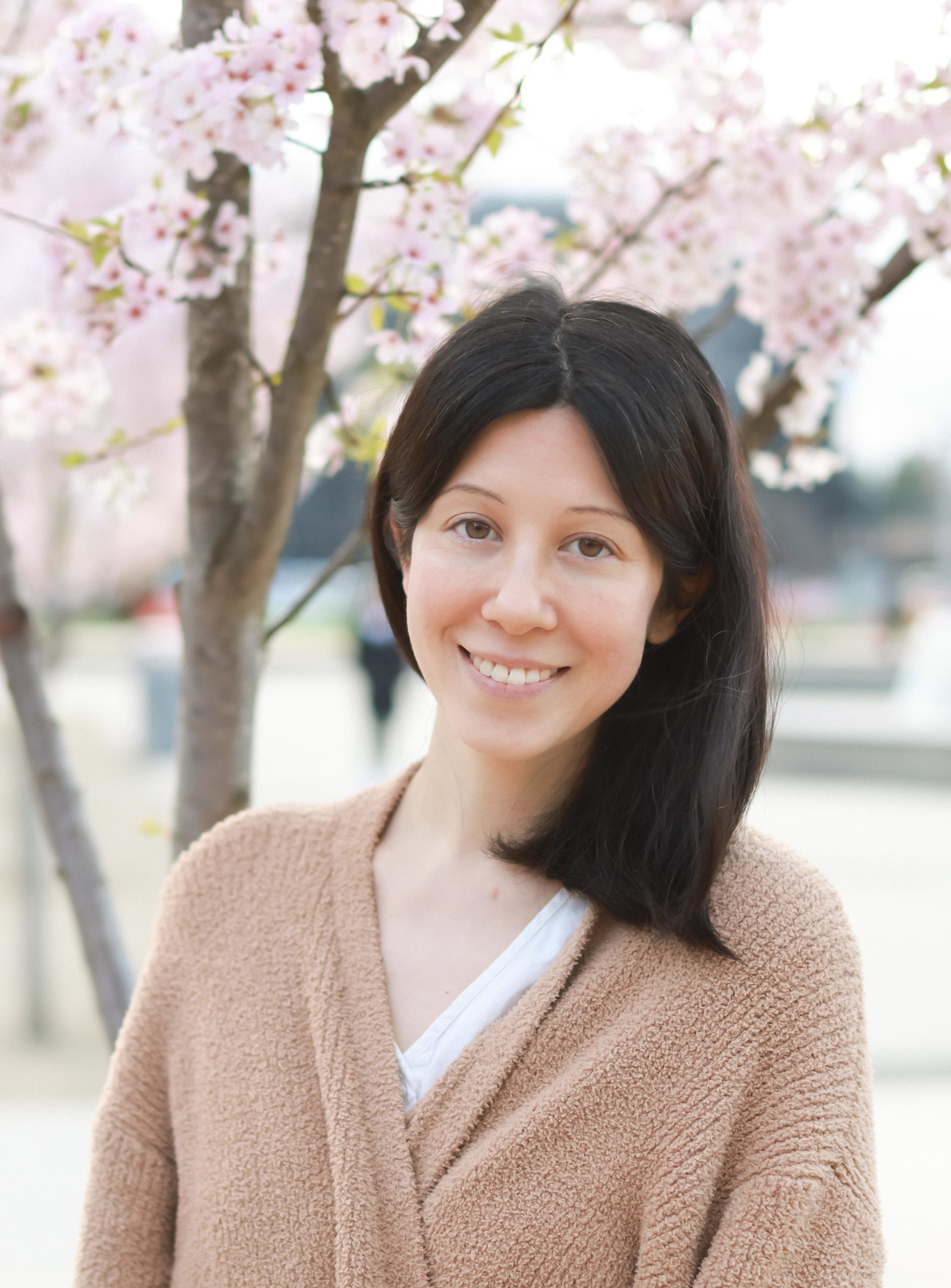Kristen Loesch’s newest book, The Regeneration of Stella Yin, will be released November 30, 2022, from Ad Hoc Fiction. This novella-in-flash tells the story of two women inextricably linked in a technological quest to overcome grief and trauma. Through precisely crafted prose, Loesch explores artificial super intelligence, the singularity, and the human drive for survival. Thanks to Kristen for letting me have an early peek at her book, and for taking time to answer my questions!
–Myna Chang

MYNA CHANG: Tell us about your novella-in flash. What is it about? What themes does it explore?
Kristen Loesch: In “The Regeneration of Stella Yin,” a woman enrolls in a form of virtual reality grief therapy in which you live out your revenge fantasies against the person who caused your grief. The novella also tells the story of the creator of that therapy. It’s set in a near-future dystopia.
Thematically, I would say that the narrative covers and explores three main areas: grief and loss and trauma and guilt; also immigration, cultural identity, and self-image; and finally virtual reality, artificial intelligence, the technological singularity, and man versus machine.
MC: I was struck by your unique vision of the singularity, and the women who drive the story. What was your inspiration?
Kristen: The story was originally just about a ‘revenge’-themed virtual reality experience. I wanted it to read like an early episode of Black Mirror. (I live in a city that is dominated by the tech industry, so that’s probably part of it!) But in expanding the novella, I felt the urge to fill in more of the landscape around my characters. That’s where the singularity came in (I’ve always been fascinated by it!). It’s difficult to pinpoint the exact moment that I realized what was actually going on in their world, but I think I was inspired by my characters themselves, if that doesn’t sound too odd—they’d taken over the story by that point, and they forced my hand. One might say this is a microcosm of the singularity itself…! A writerly singularity.
MC: One of the main characters in your story, Liyun Li, has a spectacular character arc. I think this is one of the best origin stories I’ve read. How would you describe Liyun? How do you want readers to feel about her? Do you see her as a villain or a savior (or something in between)?
Kristen: Thank you for saying such lovely things about her arc and her origin story. Liyun is my favorite character.
I always wanted the story to center on a middle-aged Chinese woman who is capable of things, both good and bad, that people might not necessarily expect someone like her to be capable of. In my opinion, Liyun is incredible. But I also think, deep down, she believes that although she’s done these astonishing, unthinkable things, she’s still somehow lacking, wanting, still coming up short. Maybe even failing. I really wanted to bring out something that might resonate with people who have grown up in families (particularly immigrant families) where the expectations are sky-high, where the pressure to be perfect is immense, and any achievements you do amass are never quite enough.
In a film version of this novella, Liyun’s a villain. But in the writing, where you can live right in her head? I’ll leave that up to the reader!
MC: What appealed to you about using ASI in your story? How did you prepare for writing the tech aspects of this story?
Kristen: I had to bring in a consultant in the form of my husband! During the pandemic we shared an “office,” and I picked up a lot of random jargon that I then proceeded to use haphazardly in the novella. He ended up tech-copy-editing it for me, which was an interesting process. He’d be asking “do you even know what this word means?” to which my answer would be “No, but my character knows what that word means!” That said, any errors are 100% my own.
Artificial intelligence (and ASI) is one of those funny things where the “reality” of it and the current state of the tech are not especially compelling to me. It’s the theoretical possibilities that can only be brought out in fiction that I find captivating. I love reading stories that feature any form of AI; you and I have discussed The Murderbot Diaries series by Martha Wells, which is one of the best out there right now. There’s so much richness in the idea of artificial intelligence. There are so many ways you can go, and here I just went one of them!
MC: As a flash fiction fan, I loved the masterful way you utilized various flash forms. How do these succinct pieces contribute to the whole? And why choose flash as the vehicle for this story? Would it have been possible to tell this story in a more traditional narrative?
Kristen: This is such a great question, because this novella started out as a short story that contained no flash whatsoever! It was shortlisted in Uncharted Mag’s Horror/Thriller comp, which gave me a serious confidence boost—but also made me realise that this story was screaming out for something and I couldn’t quite identify what. I ended up workshopping it with my writer’s group and one of the other writers suggested that the scenes would work better as flashes. That was the turning point. I knew that she was right pretty much instantaneously, but it was scary to admit it to myself.
Given the subject matter and themes, especially, I think the form is ultimately what brings this novella to life. That said, the transformation from a more traditionally told short story wasn’t seamless, and there were times when I was ready to give up altogether. But the Hall of Fame pitcher Greg Maddux once said something like (I’m going to paraphrase significantly here…) when I’m in trouble, I throw softer, not harder. So I slowed down in the trickiest places, and tried to go inward instead of just forward. I experimented a lot, and that’s how many of the different individual flash forms came about.
MC: I was blown away by the exacting nature of your prose, especially the way you placed hints and clues, and your use of white space. Did this come about organically as you wrote, or did you plan it ahead of time?
Kristen: You’re so kind, Myna, thank you! In the version of this N-i-F that was Commended in the Bath Novella-in-Flash award (then entitled Presence), these ‘hints’ did occur organically. I dropped them as I was going along, and they were far fewer in number and much more subtle. On some level, I knew that those touches were too subtle, but I was slightly in denial! As soon as I had a chance to work deeply in the manuscript and produce a final version, I went back and strengthened this aspect wherever I felt it would work. Presence was about half the word count that Regeneration is now, and having that room for adding length really helped.
MC: Your writing career spans a variety of genres, ranging from short humor to a historical novel to literary flash. How do you approach these different genres and forms? What are the benefits and challenges of this versatility?
Kristen: Some of it comes from a conscious “writing in breakthrough” philosophy (adapted from “living in breakthrough;” I don’t know who coined that phrase but I heard it on a podcast and loved it). I feel that trying new and different genres and forms is a great mechanism for improving your craft. There’s so much space in short fiction especially for experimentation, for challenging yourself, for pushing yourself, for failing, and whenever I’m looking to level up, I might consider entering a comp I’ve never entered, or get inspired by a form I’ve never seen before, or decide to write in a genre I believed I could never write in. I’ll give you an example! I know you’re familiar with my FlashBack Fiction (and now Best Microfiction!) story, “Tapeworm,” which is a one-sentence micro. I wrote “Tapeworm” because I was so astounded by a different one-sentence flash (“All Your Fragile History” by Jasmine Sawers) that had placed second in SmokeLong Quarterly’s flash fiction award earlier that year. I may have spoken in one-sentence flashes for the rest of that day, after reading it! I knew I had to try to do one myself. This process is terrifying because you feel like you’re always right on the knife-edge of your abilities as a writer. Of course, that’s what makes it so thrilling when you do succeed.
There was one benefit I wasn’t entirely expecting. In trying out so many different things, I inadvertently discovered what I love writing most of all, just for the pure, blissful experience of it: speculative fiction.

MC: Your debut historical novel, The Last Russian Doll, is coming out in March 2023 in the US and Canada (and was published in the UK as The Porcelain Doll.) Can you tell us a bit about the story?
Kristen: The Last Russian Doll is about a young woman who returns to her hometown to solve a murder, and ends up unraveling the devastating history of her family in Soviet Russia. She starts out with nothing but a key and her mother’s eerie collection of porcelain dolls.
Honestly, this novel is probably the great love of my life. I spent years writing it, it’s undergone too many drafts and title changes to count, it’s haunted by the ghost of my postgraduate and doctoral work in Russian Studies, and by now I have nearly all 94K words of it memorized by heart. It was also such a difficult book to write, because the plot is incredibly intricate. But one book blogger who loved it wrote on Goodreads that the story is “like a Rubik’s Cube where you think you’ve arrived at the solution, only to discover…”—and seeing quotes like that make every single moment worth it.
(You do get to find out why her mother collects dolls…!)
It’s out in the UK and will also be published next year in Germany, Italy, Spain and Latin America, Hungary, Bulgaria, Romania, Serbia, and Croatia. I’m pretty excited to see it in all these other languages/translations and for all the different covers!
MC: Did you find writing a novella-in-flash significantly different than the more traditional novel? Was the process different to pitch and publish the novella?
Kristen: Writing a traditional novel is a grind. It is a sit-down, stare-at-nothing, pull-your-hair-out type of process. It’s often dull, dreary, frustrating beyond words. You get sick of your characters, of your story, of your screen. It requires so much persistence and dedication that they should hand out medals just for finishing, the way they do for marathons. In the end, you feel like you have hemorrhaged to death right into your book. Then you deliver it, gasping and staggering, to your beta readers or agent or editor or whomever it is that has the job of telling you everything that’s wrong with it and why the first fifteen chapters need to be rewritten from scratch.
Standalone flash, on the other hand, requires a delicate touch and a lot of room to breathe. Rather than forcing every word of the story out onto the page, it’s more about what’s not being said. Sometimes I feel like if you break a sweat writing flash, it’s a sign you need to delete what you’ve written and start over. Everything has to be painfully light and clean. I wouldn’t be surprised if they compared the brain scans of writers and discovered that novelists use an entirely different part of the brain to write!
This novella fell somewhere in-between, but in the most difficult way possible. It was a bit like taking the most frustrating parts of both processes and trying to braid them together. I wish I’d had Michael Loveday’s craft guide when I first started out, not only for the great tips, but also for the comfort of knowing that it’s not just me or my story; a N-i-F is a unique challenge and that’s how it’s supposed to be.
MC: What’s next for you?
Kristen: I’ve just finished my second novel, a historical gothic suspense that takes place in 1930s Shanghai and 1950s Hong Kong. I’ve had the best fun writing it, but there are definitely edits to come on the manuscript! I’ve settled on an idea for my third novel as well, and will probably start that towards the end of this year, but I am also just feeling my way forward as a speculative writer. I’d love to be published in more horror and spec-fic magazines, to read more in those genres, to join the HWA, to get to know the community, and so on. Overall, I’m excited to see where this writing journey will take me next!
***
Kristen’s novella-in-flash, The Regeneration of Stella Yin, will be released by Ad Hoc Fiction November 30, 2022. Her debut historical novel, The Last Russian Doll, is forthcoming from Berkley/Penguin Random House in the US & Canada in March 2023. It is available for preorder here.
KRISTEN LOESCH grew up in San Francisco. She holds a BA in History, as well as a master’s degree in Slavonic Studies from the University of Cambridge. Her debut historical novel, THE LAST RUSSIAN DOLL, was shortlisted for the Caledonia Novel Award and longlisted for the Bath Novel Award under a different title. After a decade living in Europe, she now resides in the Pacific Northwest with her husband and children. She can be contacted via her website www.kristenloesch.com or on Twitter @kristenloesch.
MYNA CHANG (she/her) is the host of Electric Sheep SF. Her work has been selected for Flash Fiction America (W.W. Norton), Best Small Fictions, CRAFT, Best Indie Speculative Fiction, and Daily Science Fiction, among others. She has won the Lascaux Prize in Creative Nonfiction and the New Millennium Award in Flash Fiction. Her chapbook, The Potential of Radio and Rain, will be published by CutBank Books in 2023. Find her on Twitter @MynaChang.
